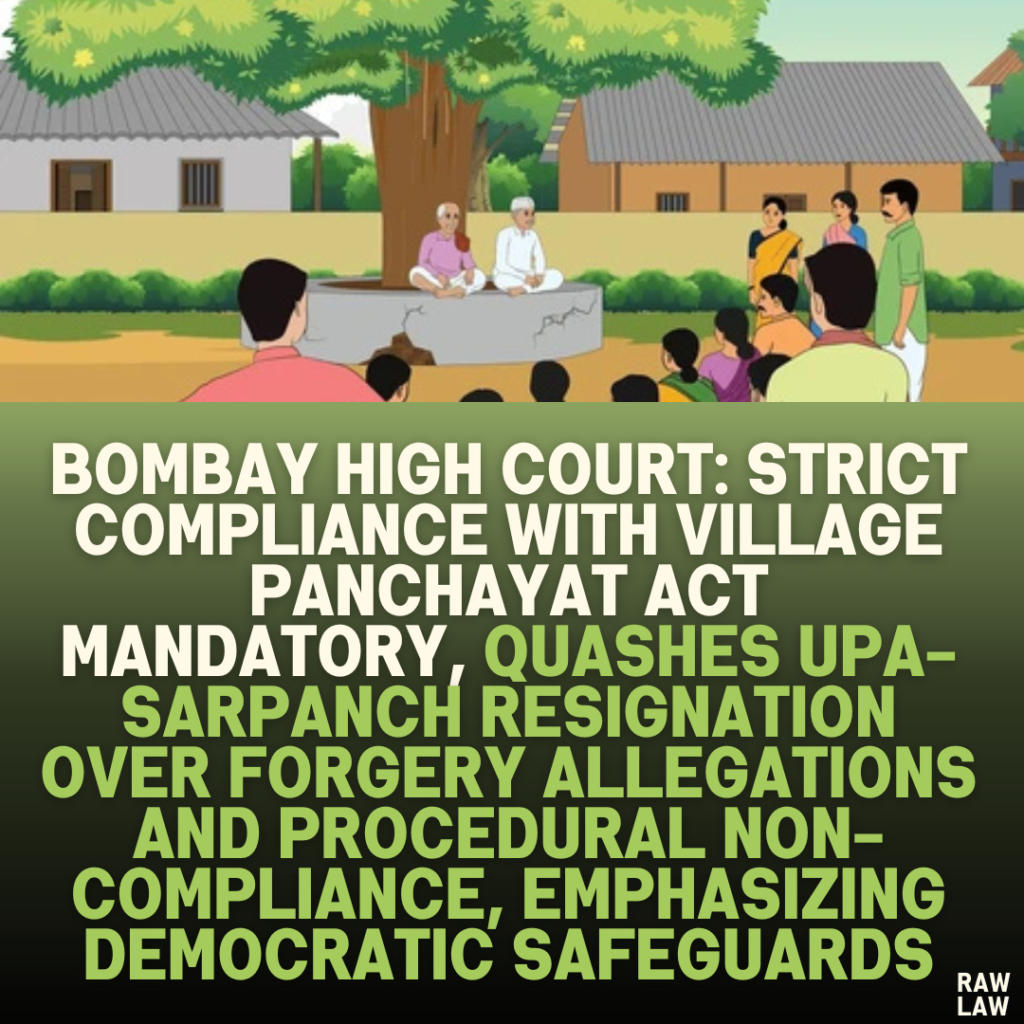Court’s Decision
The Bombay High Court ruled in favor of the petitioner and quashed the orders of the Additional Collector and Additional Divisional Commissioner. It held that the resignation of the petitioner (an elected Upa-Sarpanch) did not take effect due to procedural non-compliance with the Village Panchayats Act, 1959 and the Bombay Village Panchayats (Delivery of Notice of Resignation) Rules, 1965 (Resignation Rules). Consequently, the petitioner retained the position of Upa-Sarpanch of the Gram Panchayat, Rasegaon.
Facts
- Election and Position:
- The petitioner was elected as a Gram Panchayat member in 2022 and subsequently as Upa-Sarpanch.
- Alleged Resignation:
- A resignation letter dated November 10, 2023, was presented by the respondents. The petitioner denied signing or submitting this resignation and alleged forgery of his signature.
- Gram Panchayat Meeting:
- On November 29, 2023, during a Gram Panchayat meeting, the resignation letter was presented. Despite the petitioner’s absence (due to illness), the resignation was declared valid and approved by resolution.
- Petitioner’s Objection:
- The petitioner immediately objected via text message to the Gram Sevak and later filed a dispute with the Additional Collector, claiming forgery and procedural lapses.
- The Collector dismissed the petitioner’s dispute, as did the Additional Divisional Commissioner on appeal.
- High Court Petition:
- Aggrieved by these decisions, the petitioner approached the Bombay High Court, challenging the findings of the authorities.
Issues
- Was the resignation letter genuine or forged?
- The petitioner asserted that his signature was forged on the resignation letter.
- Were statutory procedures under the Village Panchayats Act and Resignation Rules followed?
- The petitioner alleged non-compliance with essential procedures, including acknowledgment of resignation in the prescribed format.
Petitioner’s Arguments
The petitioner contested the validity of the resignation and argued:
- Forgery of Resignation Letter:
- The resignation letter was fabricated, with the petitioner’s signature forged.
- Non-Compliance with Rules:
- The statutory procedure for accepting and acknowledging the resignation was not followed. Specifically:
- The acknowledgment receipt in Form II, as required under the Resignation Rules, was never issued.
- There was no record of the Sarpanch receiving the resignation or forwarding it to the Gram Sevak.
- The statutory procedure for accepting and acknowledging the resignation was not followed. Specifically:
- Illness and Communication:
- The petitioner was hospitalized during the meeting and was not served proper notice of the agenda. His objections were raised promptly via text messages.
- Democratic Representation:
- The petitioner emphasized that he was a democratically elected Upa-Sarpanch and could not be unseated without strict compliance with the law.
Respondents’ Arguments
The respondents defended the validity of the resignation and argued:
- Voluntary Resignation:
- The resignation letter was genuine, voluntarily submitted, and witnessed by two members of the Gram Panchayat.
- Sufficient Notice:
- The petitioner was informed of the meeting via WhatsApp and email, fulfilling the requirement of notice.
- Lack of Forgery Evidence:
- The petitioner failed to produce evidence supporting his claims of forgery.
- Delay in Objections:
- The petitioner raised objections only after the Gram Panchayat meeting, indicating an afterthought.
Analysis of the Law
The Court meticulously analyzed the legal framework governing the resignation of elected Gram Panchayat members:
- Section 34 of the Village Panchayats Act, 1959:
- An Upa-Sarpanch can resign by submitting a written notice addressed to the Sarpanch.
- The resignation must be delivered in the prescribed manner under the Resignation Rules.
- Bombay Village Panchayats (Delivery of Notice of Resignation) Rules, 1965:
- Rule 3 mandates:
- The resignation must be in Form I.
- Acknowledgment of receipt must be issued in Form II by the Sarpanch or other prescribed authority.
- The acknowledgment is crucial for validating the resignation process.
- Rule 3 mandates:
- Case Law:
- The Court cited several precedents emphasizing strict compliance with statutory procedures for resignation:
- Neena Kalyan v. Commissioner (2018): Resignation can be withdrawn before being placed before the meeting.
- Babanrao Uttamrao Jadhav v. Additional Collector (2016): Highlighted the right to withdraw resignation before it takes effect.
- Janardhan v. State of Maharashtra (2024): Stressed mandatory adherence to the Resignation Rules.
- The Court cited several precedents emphasizing strict compliance with statutory procedures for resignation:
Court’s Reasoning
The Court found significant procedural irregularities:
- No Acknowledgment in Form II:
- There was no evidence of acknowledgment of the resignation by the Sarpanch as required by Rule 3(3).
- Failure to Follow Procedures:
- The resignation process deviated from the prescribed method under the Act and Rules.
- The resignation letter was directly presented at the meeting without being properly delivered and acknowledged.
- Strict Compliance Essential:
- Citing Taylor v. Taylor, the Court emphasized that statutory procedures must be followed “in the prescribed manner or not at all.”
- Given the petitioner’s consistent denial of resignation, strict adherence to the rules was essential.
- Collector’s Oversight:
- The Collector and Divisional Commissioner failed to examine whether the resignation process complied with statutory requirements.
Conclusion
- Resignation Invalid:
- The Court held that the resignation was invalid due to procedural lapses and the absence of acknowledgment in Form II.
- Petitioner Reinstated:
- The petitioner was declared to have continued in the position of Upa-Sarpanch.
- Quashing of Orders:
- The orders of the Additional Collector and Additional Divisional Commissioner were quashed.
Implications
- Democratic Safeguards:
- The judgment underscores the importance of procedural safeguards to protect democratically elected representatives from arbitrary removal.
- Mandatory Compliance:
- Strict adherence to statutory rules is essential, particularly in matters affecting elected offices.
- Accountability of Authorities:
- Administrative authorities must ensure that statutory procedures are strictly followed and decisions are supported by evidence.




Pingback: Calcutta High Court Dismisses Railways' Plea, Upholds Tribunal's Directive for Regularizing Parcel Porters – "Judicial Propriety Demands Respect for Findings Based on Similar Facts" - Raw Law